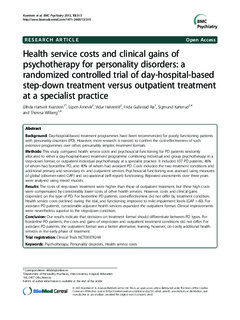Health service costs and clinical gains of psychotherapy for personality disorders: a randomized controlled trial of day-hospital-based step-down treatment versus outpatient treatment at a specialist practice
Kvarstein, Elfrida Hartveit; Arnevik, Espen Kristian; Halsteinli, Vidar; Rø, Frida Gullestad; Karterud, Sigmund; Wilberg, Theresa
Journal article, Peer reviewed
Permanent lenke
http://hdl.handle.net/11250/302203Utgivelsesdato
2013Metadata
Vis full innførselSamlinger
Sammendrag
Background: Day-hospital-based treatment programmes have been recommended for poorly functioning patients
with personality disorders (PD). However, more research is needed to confirm the cost-effectiveness of such
extensive programmes over other, presumably simpler, treatment formats.
Methods: This study compared health service costs and psychosocial functioning for PD patients randomly
allocated to either a day-hospital-based treatment programme combining individual and group psychotherapy in a
step-down format, or outpatient individual psychotherapy at a specialist practice. It included 107 PD patients, 46%
of whom had borderline PD, and 40% of whom had avoidant PD. Costs included the two treatment conditions and
additional primary and secondary in- and outpatient services. Psychosocial functioning was assessed using measures
of global (observer-rated GAF) and occupational (self-report) functioning. Repeated assessments over three years
were analysed using mixed models.
Results: The costs of step-down treatment were higher than those of outpatient treatment, but these high costs
were compensated by considerably lower costs of other health services. However, costs and clinical gains
depended on the type of PD. For borderline PD patients, cost-effectiveness did not differ by treatment condition.
Health service costs declined during the trial, and functioning improved to mild impairment levels (GAF > 60). For
avoidant PD patients, considerable adjuvant health services expanded the outpatient format. Clinical improvements
were nevertheless superior to the step-down condition.
Conclusion: Our results indicate that decisions on treatment format should differentiate between PD types. For
borderline PD patients, the costs and gains of step-down and outpatient treatment conditions did not differ. For
avoidant PD patients, the outpatient format was a better alternative, leaning, however, on costly additional health
services in the early phase of treatment.
